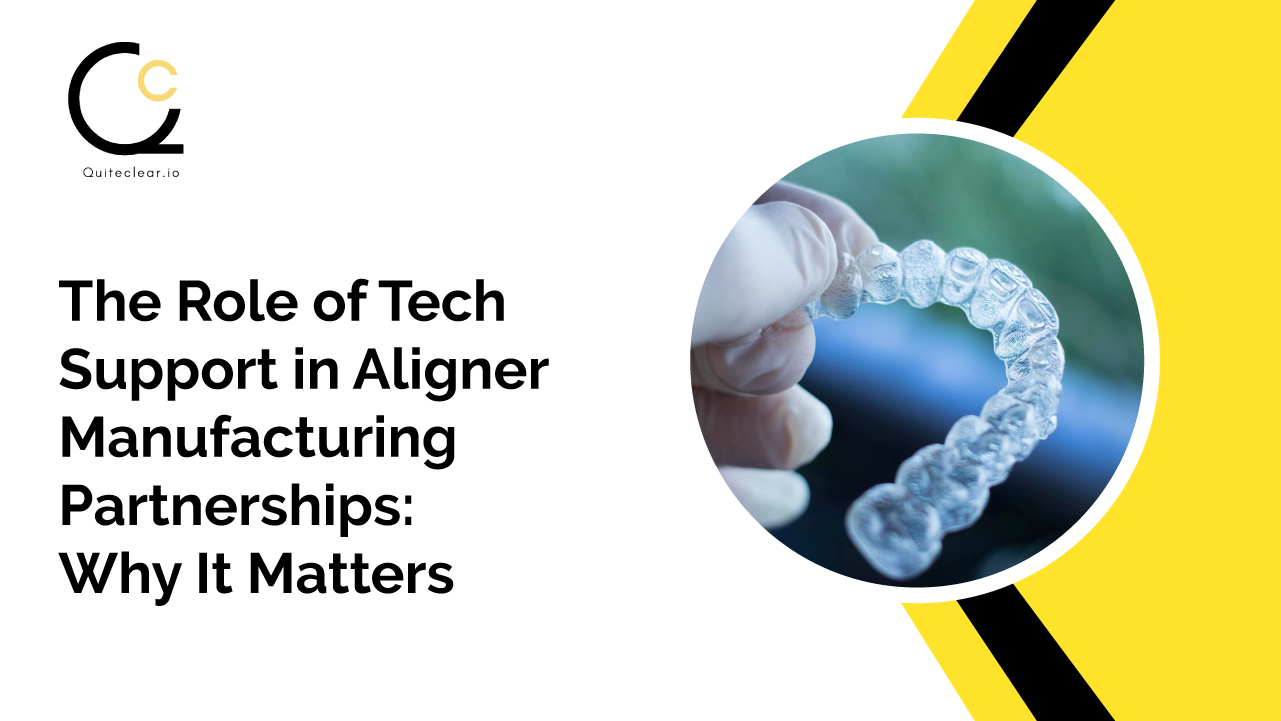The Role of Tech Support in Aligner Manufacturing Partnerships: Why It Matters

What makes a great aligner manufacturing partner? Advanced 3D printing? Faster turnaround times? Lower costs? While all of these matter, the true game-changer is something less obvious but far more powerful: strong, reliable tech support. In an industry where precision and timelines define patient outcomes, tech support isn’t just a “nice-to-have”, it’s the backbone of a lasting, successful partnership.
Aligner manufacturing partnerships are built on more than just machinery and materials. They’re ecosystems where dental brands, manufacturers, and technology must work in harmony. Without the right technical support, even the most advanced systems can become bottlenecks, slowing production, driving up costs, and eroding trust. To understand why tech support plays such a crucial role, let’s first examine what these partnerships entail and the challenges they present.
Understanding Aligner Manufacturing Partnerships
At first glance, aligner manufacturing may seem like a straightforward process: a clinic sends patient scans, and the manufacturer delivers finished aligners. In reality, it’s a highly coordinated partnership that blends design, manufacturing, and logistics into one seamless workflow.
What do these partnerships typically involve?
- Design: Digital treatment planning, 3D modeling, and case customization using CAD/CAM and specialized software.
- Manufacturing: Precision 3D printing, thermoforming, trimming, and quality control to ensure aligners meet clinical and regulatory standards.
- Logistics: Packaging, shipping, and timely delivery of aligners to dental practices across regions or even globally.
Why is collaboration critical?
Dental brands and manufacturers must work hand in hand at every step. Clinics rely on manufacturers for technical accuracy and scalability, while manufacturers depend on clinics for consistent case data and feedback. Strong collaboration ensures:
- Faster case turnaround times.
- Consistency in aligner fit and patient comfort.
- Smooth scaling when brands grow their case volumes.
Key challenges without adequate support
When tech support is missing or inadequate, small problems quickly turn into major disruptions:
- Misaligned digital workflows leading to rework or delays.
- Unresolved software or machine errors are slowing down production.
- Communication gaps that increase remakes and costs.
- Frustration for both dentists and patients due to missed deadlines.
In short, aligner manufacturing partnerships thrive only when backed by reliable technical support. Without it, efficiency, quality, and trust are the first to suffer.
The Role of Tech Support in the Partnership
In aligner manufacturing, technology doesn’t just support the process; it drives it. From digital design to final delivery, every step depends on seamless systems working in sync. This is where strong technical support becomes indispensable.
Smooth Onboarding & Integration: When a dental brand partners with a manufacturer, the first challenge is often integrating digital workflows. Tech support teams play a key role in setting up CAD/CAM systems, 3D printing infrastructure, and case management software so that clinics and labs can exchange data effortlessly. Beyond installation, they also train teams on proprietary platforms, ensuring that staff understand not just how to use the tools, but how to optimize them for speed and accuracy. This smooth onboarding sets the stage for a scalable partnership.
Troubleshooting & Issue Resolution: Even the best systems encounter glitches, from 3D printers that suddenly stop mid-run to software errors that distort aligner designs. In these moments, real-time technical support is the difference between a minor hiccup and a costly production delay. By providing immediate troubleshooting, tech support minimizes downtime, keeps aligner delivery on schedule, and prevents cascading issues that could affect multiple patient cases.
Quality Assurance & Compliance: Aligner manufacturing must meet strict dental and regulatory standards, leaving no room for compromise. Tech support ensures that production processes adhere to these benchmarks by running regular checks, monitoring machine calibration, and identifying anomalies before they affect product quality. With continuous feedback loops, support teams help brands maintain compliance, reduce remakes, and deliver aligners that fit patients with precision.
Scaling & Innovation: As brands grow, so do their demands. Tech support enables manufacturers to scale operations seamlessly by upgrading software, expanding digital workflows, and integrating new tools such as AI-driven treatment planning. Beyond scaling, they also guide brands through innovation, helping them adopt new treatment models, improve efficiency, and stay ahead in a rapidly evolving orthodontic landscape.
Why Tech Support Matters Beyond Problem-Solving?
It’s easy to think of tech support as a “break-fix” function, something you call only when systems go wrong. But in aligner manufacturing partnerships, its role goes far deeper. Effective technical support doesn’t just solve problems; it prevents them, strengthens relationships, and creates long-term value for both partners.
- Builds trust and transparency in the partnership: When manufacturers provide proactive, reliable support, it creates a sense of confidence for dental brands. Instead of worrying about hidden issues or last-minute surprises, brands know they’re backed by a partner who is invested in their success. This transparency fosters collaboration and strengthens the foundation of the partnership.
- Reduces operational costs by preventing recurring issues: Unresolved technical glitches often lead to repeated remakes, delays, and wasted resources. Strong tech support teams don’t just fix errors; they analyze the root causes to prevent them from happening again. This proactive approach helps aligner brands lower their operational costs and run leaner, more efficient processes.
- Enhances patient outcomes through consistent product quality: Every aligner produced impacts a patient’s treatment journey. By ensuring processes stay compliant and systems remain accurate, tech support directly contributes to better-fitting aligners, fewer adjustments, and smoother treatments. Ultimately, strong support behind the scenes translates into healthier smiles for patients.
- Differentiates a manufacturer in a competitive market: In a space where many manufacturers promise speed and low costs, reliable tech support is a key differentiator. Dental brands are more likely to choose and stick with partners who not only deliver products but also provide ongoing expertise and guidance. It’s this added layer of support that turns a transactional vendor relationship into a long-term strategic alliance.
How to Evaluate Tech Support in a Manufacturing Partner?
Choosing the right aligner manufacturing partner means looking beyond cost and capacity; the quality of their tech support is just as critical. Key factors to consider:
- Response times & availability: Ensure 24/7, multilingual support so issues never stall production.
- Technical expertise: Look for deep knowledge in software, hardware, and regulatory compliance.
- Proactive training: Partners who offer training, resources, and workshops help prevent issues before they arise.
- Reputation & feedback: Check case studies and peer reviews to confirm reliability and transparency.
By using this checklist, aligner brands can ensure they’re partnering with a manufacturer whose technical support is robust, reliable, and designed to scale with their business.
In the fast-moving world of clear aligners, technology alone isn’t enough; it’s the tech support behind the systems that ensures efficiency, quality, and trust. From smooth onboarding to scaling innovation, strong support transforms manufacturers into true partners. At Quiteclear, we believe in going beyond production to provide the expertise and guidance our partners need to deliver confident smiles, every time.
Looking to scale your aligner brand with a partner who prioritizes both technology and support? Connect with Quiteclear to explore how we can grow together.
